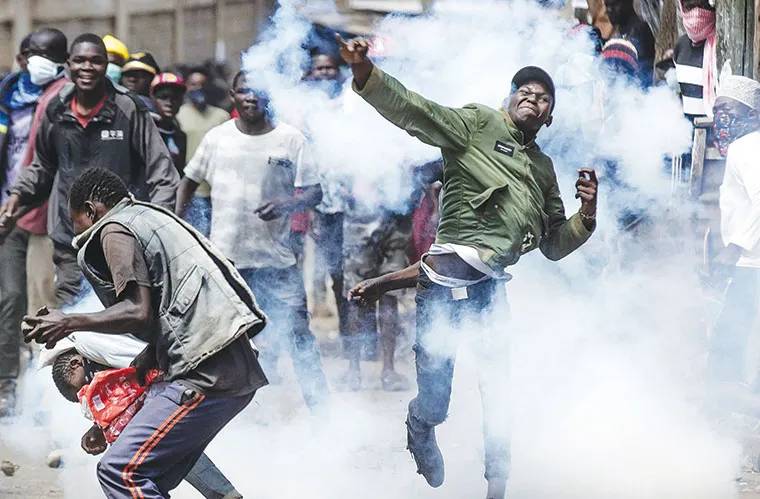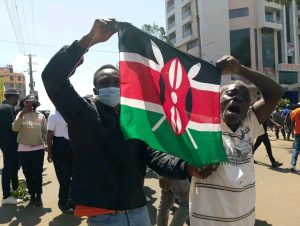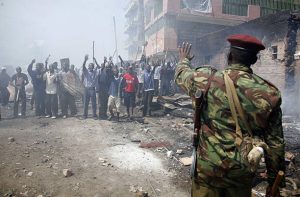News
“I Knew Going to State House Was a Wrong Decision,” Omtatah Confesses
“I didn’t want another life lost when we were just commemorating the death of other people.”

Busia Senator reveals he deliberately discouraged protestors from marching to State House during deadly June 25 demonstrations
NAIROBI, Kenya – Busia Senator Okiya Omtatah has made a startling confession about his role during the June 25 anniversary protests, revealing that he deliberately prevented demonstrators from marching to State House because he feared it would result in mass casualties.
Speaking to reporters on Thursday morning, the human rights advocate disclosed that he strategically positioned himself to attract crowds and discourage what he believed would be a deadly confrontation.
“There was very big pressure for people to march to State House, and one of the reasons I was sitting down and attracting the crowd was to stop that march because I knew people were going to be killed,” Omtatah stated.
“I didn’t want another life lost when we were just commemorating the death of other people.”
His calculated intervention came amid nationwide protests marking the first anniversary of the deadly June 25, 2024, anti-government demonstrations that saw protesters storm Parliament over the controversial Finance Bill.
Despite Omtatah’s efforts to prevent a march on State House, Wednesday’s protests still turned deadly. At least 16 people were confirmed dead by the end of the day, with most killed by police according to Amnesty International Kenya.
The organization’s Executive Director, Irungu Houghton, confirmed that five deaths were specifically caused by gunshots.
The Kenya National Commission on Human Rights (KNCHR) reported over 400 casualties, including protesters, police officers, and journalists, citing “allegations of excessive use of force, including rubber bullets, live ammunition and water cannons.”
The Independent Policing Oversight Authority (IPOA) reported at least 61 arrests, while Kenyatta National Hospital received over 100 wounded, most suffering from gunshot injuries.
Omtatah used the ongoing crisis in Sudan as a cautionary tale, urging Kenyans to channel their anger through democratic means rather than violent uprising.
“You can see where Sudan is, because Sudan was not able to harness the anger of the people and to guide it away from being an uprising to being a revolution,” he warned, referencing the neighboring country’s ongoing conflict.
The Senator’s strategy appears to have been informed by his understanding of crowd psychology and the potential for escalation when protesters approach symbols of state power.
Rather than supporting calls for immediate change through street protests, Omtatah advocated for a “revolution via the ballot” in the 2027 elections. He emphasized the importance of voter registration and electoral monitoring, calling on citizens to prepare for the upcoming polls by ensuring all eligible Kenyans are registered voters.
“People must be registered as voters, and once they are registered, we must prepare to go to elections and monitor all polling stations,” he said. The Senator also called on the Independent Electoral and Boundaries Commission (IEBC) to enhance transparency by publishing GPS locations of all polling stations, an effort he believes would help prevent electoral irregularities similar to those reported in 2022.
Omtatah’s participation in the protests was notable – he joined the demonstrations wearing a white T-shirt emblazoned with “Respect Kenya” and was warmly welcomed by Gen Z protesters who expressed excitement at his presence.
However, his revelation about deliberately discouraging the State House march highlights the complex calculations political leaders must make during times of civil unrest.
The Senator’s decision to prioritize immediate safety over potentially more dramatic protest action reflects a strategic approach to political change that favors long-term democratic processes over short-term confrontation.
The June 25, 2025 protests commemorated the first anniversary of Kenya’s most significant anti-government demonstrations in recent history.
The 2024 protests, initially peaceful, resulted in at least two protester deaths on June 20, with around 200 injuries reported. The demonstrations culminated in protesters storming Parliament on June 25, 2024.
The human cost of the protests continues to resonate with families like that of 23-year-old Denzel Onyango, an engineering student who was among the crowd that stormed Parliament. His body was found floating in an abandoned quarry two weeks later, adding to the growing list of casualties from the protests.
As Kenya grapples with ongoing political tensions and economic challenges, Omtatah’s approach represents a faction of the opposition that believes in working within existing democratic institutions rather than seeking immediate change through street protests.
His confession about preventing the State House march raises important questions about leadership during times of civil unrest and the responsibility of political figures to balance public anger with public safety.
The Senator’s call for civic engagement and electoral preparation suggests that while the immediate crisis may have passed, the underlying issues that drove thousands to the streets remain unresolved, setting the stage for a potentially pivotal 2027 election.
Kenya Insights allows guest blogging, if you want to be published on Kenya’s most authoritative and accurate blog, have an expose, news TIPS, story angles, human interest stories, drop us an email on [email protected] or via Telegram
-

 Business1 week ago
Business1 week agoEastleigh Businessman Accused of Sh296 Million Theft, Money Laundering Scandal
-

 Investigations6 days ago
Investigations6 days agoInside Nairobi Firm Used To Launder Millions From Minnesota Sh39 Billion Fraud
-

 Business1 week ago
Business1 week agoMost Safaricom Customers Feel They’re Being Conned By Their Billing System
-

 Business1 week ago
Business1 week agoEXPLOSIVE: BBS Mall Owner Wants Gachagua Reprimanded After Linking Him To Money Laundering, Minnesota Fraud
-

 News6 days ago
News6 days agoUnfit for Office: The Damning Case Against NCA Boss Maurice Akech as Bodies Pile Up
-

 News1 week ago
News1 week agoTax Payers Could Lose Millions in KWS Sh710 Insurance Tender Scam As Rot in The Agency Gets Exposed Further
-

 News1 week ago
News1 week agoPastor James Irungu Collapses After 79 Hours Into 80-Hour Tree-Hugging Challenge, Rushed to Hospital
-

 Sports1 week ago
Sports1 week agoFury as Bettors Demand Probe Into Betika Over Alleged Unpaid Winnings

















